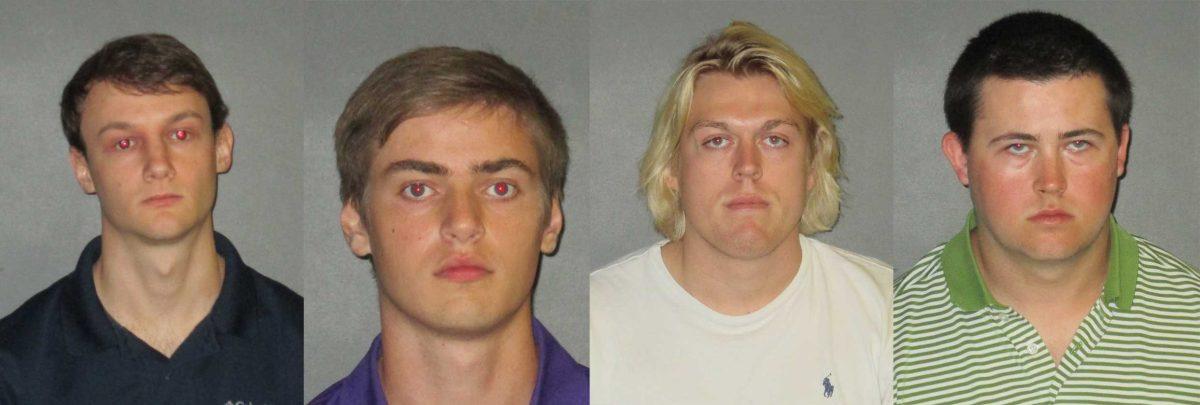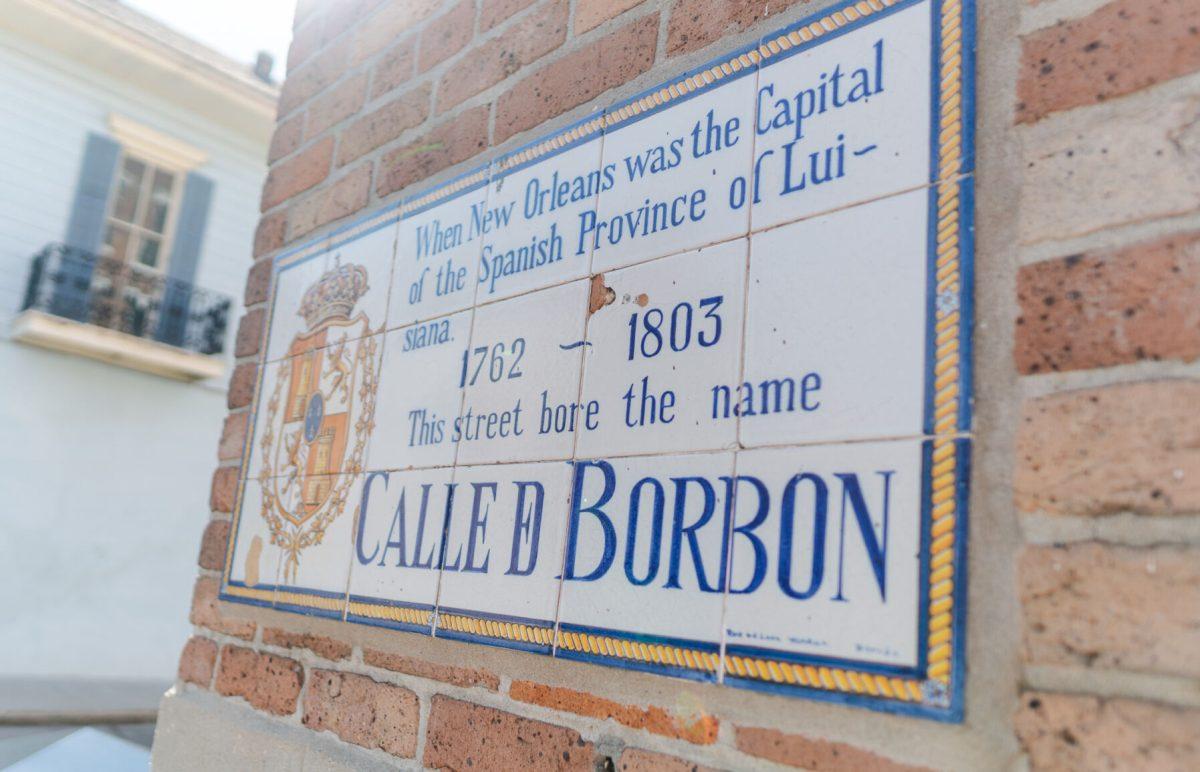The four men who were indicted on hazing charges for the death of Max Gruver are still facing trials for their actions one year later.
LSUPD arrested 10 men on Oct. 11 on hazing charges, with one receiving an additional charge of negligent homicide after Phi Delta Theta fraternity pledge Max Gruver died from alcohol poisoning after a hazing ritual called “Bible Study.”
Matthew Naquin, who was arrested for negligent homicide, was said to be the most aggressive in the hazing incident, followed by Sean-Paul Gott, according to the arrest report.
A pledge said he felt Naquin was yelling at Gruver more and that Naquin did not like Gruver. A former pledge said Naquin told him several days before he wanted to “cut” Gruver from the pledge process because Gruver was always late.
Gott struck a pledge in the head with a bottle, giving him a black eye the night of “Bible Study.” The pledge said it was an accident, according to the arrest report.
Patrick Forde and Ryan Isto were said to be main participants in the hazing event. Several pledges said Isto asked them questions and both men told pledges to take “pulls.” Forde was not an active member but still came to many fraternity events, according to the arrest report.
In addition to Naquin, Forde, Isto and Gott, LSUPD arrested Zachary Hall, Hudson Kirkpatrick, Sean Pennison, Zachary Castillo, Nicalous Taulli and Elliott Eaton. The national Phi Delta Theta organization announced they terminated the membership of the 10 men once their arrest warrants were released.
Castillo, Kirkpatrick, Hall, Eaton and Pennison are still enrolled at the University, according to the LSU Directory.
In March, the grand jury indicted Naquin on charges of negligent homicide and hazing, and Forde, Isto and Gott on charges of hazing.
Misdemeanor hazing charges can result in a fine between $10 to $100 and 10 to 30 days in prison. Negligent homicide charges can result in a fine up to $5,000 and up to five years in prison.
The grand jury decided not to charge Taulli and Pennison but pertermitted charges for the four other men. Pretermitted charges mean the defendants can be charged in the future if new evidence comes to light.
The jury also pretermitted charges of negligent homicide against Isto, charges of obstruction of justice against Castillo and charges of negligent homicide and obstruction of justice against Forde, according to the grand jury report.
Isto and Gott pleaded no contest to hazing charges on Sept. 6, meaning they neither admitted nor denied guilt but can still be sentenced as if they pleaded guilty in criminal court. This also means they cannot be found guilty in a civil suit based on the ruling in this criminal trial.
Isto and Gott also agreed to cooperate with prosecutors and testify at the trial of Naquin which is set for July 8.
Forde agreed to cooperate with the state and to testify at all future dates of the other defendants. He does not yet have a trial date set. He was not present in court on Sept. 6.
Gruver’s parents, Stephen and Rae Ann Gruver, were present in the courtroom on Sept. 6 to provide a victim’s statement.
“This has been a very long and trying journey,” Rae Ann said in the statement. “We hope those involved cooperate so we can learn what happened and move on.”
Naquin’s lawyer, John McLindon, attempted to prevent the introduction of evidence regarding Naquin’s behavior in the weeks before the incident that led to Gruver’s death. East Baton Rouge Parish Assistant District Attorney Morgan Johnson said the evidence should be introduced because it shows Naquin’s behavior was similar to the actions that led to Gruver’s death.
Johnson brought witness testimonies that detailed fraternity events prior to “Bible Study.” She used the testimonies of three former Phi Delta Theta pledges.
Johnson said these testimonies should be used as evidence in Naquin’s trial because “the jury can’t see the whole picture [without them].” She said the information in these testimonies is integral in proving Naquin was criminally negligent on the night that led to Gruver’s death.
The judge ruled to allow some of the witness testimonies in Naquin’s trial, but not all of them.
East Baton Rouge investigator for the district attorney’s office Jeff Malone interviewed several former active and new Phi Delta Theta members. He has been investigating other incidents where Naquin’s behavior was questioned. Johnson played the recorded testimonies from three pledges before the court Sept. 6.
One pledge told Malone that Naquin yelled at a pledge while watching the Mayweather v. McGregor fight at the fraternity house on Aug. 26, 2017. The pledge who was yelled at was upset and reported Naquin to other active members. The pledge said he remembers playing beer pong with Naquin that night.
One pledge told an investigator that about 12 pledges came to the fraternity house after they were summoned by active members on “hurricane day” when the University was closed for weather concerns on Aug. 30, 2017. They were forced to clean the house and were not allowed to leave until they finished the alcohol provided by Gott. He said there was about three people to one handle of alcohol.
Another pledge told Malone he vomited and lost consciousness on “hurricane day.” He said he was dehydrated and did not eat much that day. He was laid on the couch and said Pennison “took care of me well.”
The former pledge educator said it was “a typical frat party.”
One of the pledges said Gott and Isto were at the fraternity house on “hurricane day.” He said the active members wouldn’t directly tell him to “chug this” because his older brother was also an active member. But he said other pledges, who did not have older brothers in the fraternity, were forced to drink.
One pledge said Naquin was one of the active members forcing them to drink on “hurricane day.” He also said Naquin was shooting pledges with an airsoft gun while they were watching the fraternity’s tailgate on the Parade Ground on Sept. 8, the night before a football game.
Malone said Forde asked Naquin to stop shooting pledges to which Naquin responded, “I can do whatever I want.”
A pledge said he was shot by Naquin. He and some active members became upset with Naquin and made him stop shooting people. Another former pledge said the incident was shut down “in a matter of seconds.”
The fraternity’s executive board discussed Naquin’s behavior Sept. 11 — two days before the event that led to Gruver’s death — and decided to give him a warning. The pledge educator also warned Naquin one-on-one.
Naquin’s attorney said former pledge educator told the pledges many times, “you don’t have to do anything you don’t want to.”
One of Gruver’s hometown friends texted a friend who was an active member in the fraternity a picture of Gruver and said, “be nice to my friend.” The active member responded, “tell him to show up for shit on time.”
The judge will allow testimonies by active members who were on the Parade Ground when Naquin was shooting the airsoft gun. He is also allowing the state to present that the fraternity’s executive board discussed Naquin’s behavior and warned him in front of the chapter.
These arrests have led to the passage of the Max Gruver Act, signed into law on May 31, which increased hazing penalties in Louisiana. Under the Max Gruver Act, people who take part in hazing activities that result in death when the victim’s blood alcohol level is at least .30 would face up to five years in prison and fines of up to $10,000.
“We’ll live with this pain for the rest of our lives,” Stephen Gruver said during his statement. “It’s ironic in his death that he’s quickly changed laws.”
Phi Delta Theta’s national chapter removed the LSU chapter’s charter on Sept. 18, four days after Max died. The University banned the fraternity from campus until 2033.
*Editor’s Note: Hailey Auglair is a former member of Delta Gamma sorority. She is no longer affiliated with the sorority.
The Hazing Edition: Four former LSU Phi Delta Theta members face hazing charges
September 11, 2018
(Left to right) Matthew Naquin, Ryan Isto, Sean-Paul Gott, Patrick Forde were indicted by a grand jury in March 2018
More to Discover








